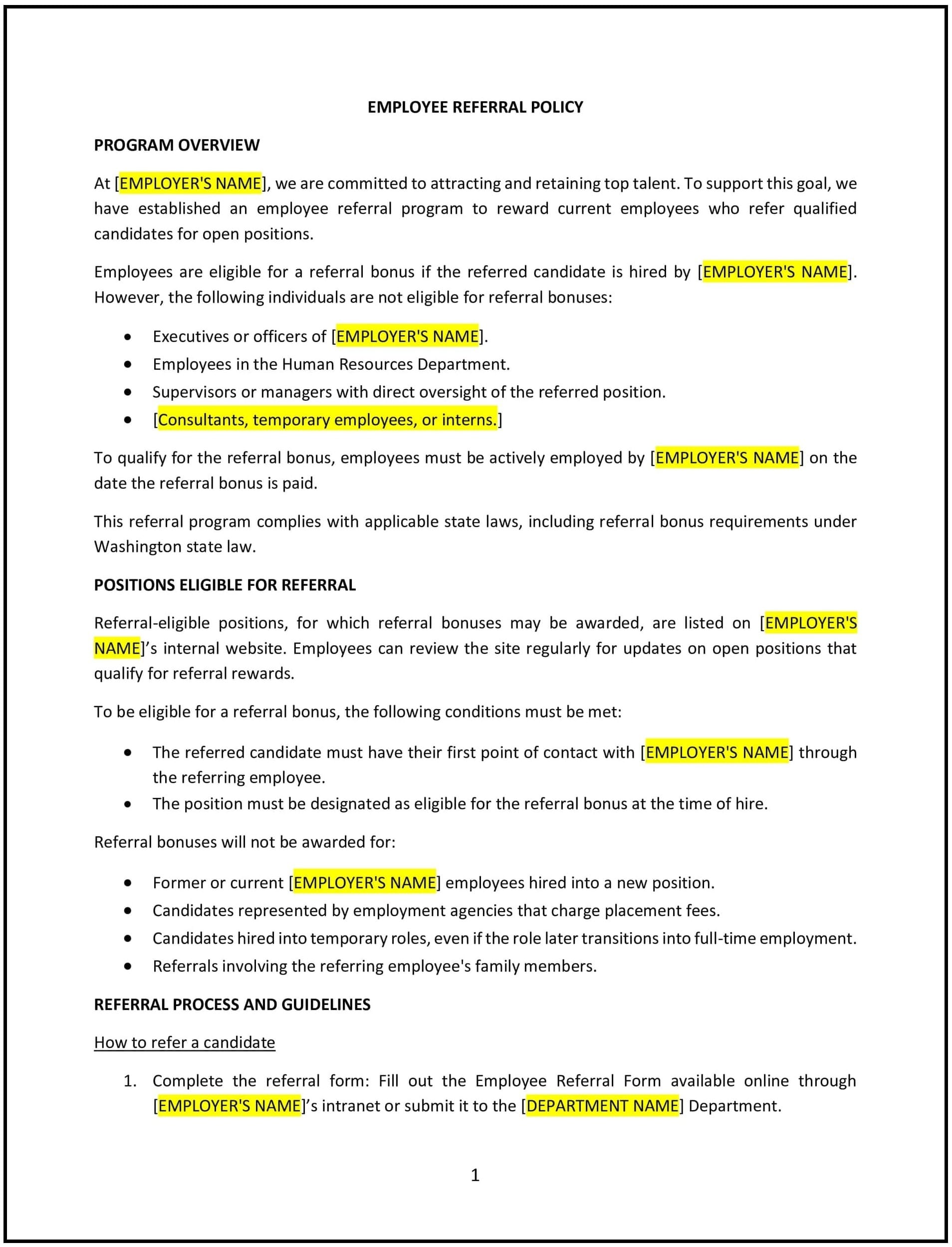Employee referral policy (Washington): Free template
Got contracts to review? While you're here for policies, let Cobrief make contract review effortless—start your free review now.

Customize this template for free
This employee referral policy is designed to help Washington businesses leverage their current workforce to attract qualified candidates through employee referrals. The policy outlines the process for employees to refer candidates for open positions and establishes the rewards or incentives available for successful hires. It also sets expectations for the types of candidates eligible for referral and the conditions under which referrals will be considered.
By adopting this policy, businesses can improve recruitment efforts, tap into their employees’ networks, and create a more engaged workforce by rewarding those who help bring in new talent.
How to use this employee referral policy (Washington)
- Define eligibility criteria for employees: Clearly specify which employees are eligible to participate in the referral program, including whether it applies to all employees or only certain groups, such as full-time staff or specific departments.
- Set clear referral guidelines: Outline the types of candidates eligible for referral, ensuring that referrals are only made for roles that align with the company’s hiring needs. Specify the skills, qualifications, or experience required for candidates to be considered.
- Establish the referral process: Provide a step-by-step guide for how employees can refer candidates, including the process for submitting referrals, whether it is through an online form, email, or a formal application system. Be clear about what information is needed, such as the candidate’s resume, cover letter, and contact details.
- Reward structure: Clearly explain the rewards or incentives employees will receive for successful referrals, such as a monetary bonus, gift cards, or additional vacation days. Specify the conditions for receiving rewards, including when the reward will be provided (e.g., once the referred candidate has passed probation or after a set period of employment).
- Address multiple referrals: The policy should specify how the company handles multiple employees referring the same candidate. For example, it may indicate that the first referral submission will be rewarded, or it may provide a shared reward if multiple employees refer the same individual.
- Outline the limitations and exclusions: Identify any limitations or exclusions to the policy, such as restrictions on referring family members or friends of current employees, or roles that are not eligible for referral bonuses.
- Promote fairness and transparency: Ensure the policy is applied consistently to all employees and that referral decisions are made transparently. Employees should be informed of the status of their referral, including whether the referred candidate has been interviewed or hired.
- Promote compliance with Washington and federal laws: The policy should comply with Washington state labor laws and federal regulations regarding employment practices, including non-discrimination laws and equal opportunity hiring standards.
- Review and update regularly: Periodically review and update the policy to ensure it continues to be compliant with any changes in Washington state laws, federal regulations, or the company’s recruitment practices.
Benefits of using this employee referral policy (Washington)
This policy offers several benefits for Washington businesses:
- Enhances recruitment efforts: By utilizing the networks of current employees, businesses can access a broader pool of qualified candidates, improving recruitment efforts and reducing the time and cost of hiring.
- Increases employee engagement: Offering rewards for successful referrals encourages employees to actively participate in the hiring process and fosters a sense of ownership and investment in the company’s success.
- Improves employee retention: Referred employees are often a better cultural fit, as they come recommended by current employees who understand the company’s culture and values. This can lead to higher retention rates and a more cohesive workforce.
- Strengthens company culture: Employee referrals can help build a strong, collaborative, and like-minded team, as employees are likely to refer candidates who align with the company’s values and work environment.
- Reduces recruitment costs: Employee referrals often reduce the need for external recruitment agencies or job advertisements, saving the company time and money in the hiring process.
- Supports legal compliance: The policy helps businesses maintain fair hiring practices and enhance compliance with Washington state and federal employment laws, including non-discrimination and equal opportunity requirements.
Tips for using this employee referral policy (Washington)
- Communicate the policy clearly: Ensure that all employees understand the employee referral policy and know how to participate. Include the policy in the employee handbook and review it during onboarding. Periodically remind employees of the program and encourage participation.
- Track referrals efficiently: Use an efficient system for tracking referrals to ensure that employees are recognized and rewarded for their efforts. This may include using an online platform, spreadsheet, or recruitment software.
- Maintain fairness: Apply the policy consistently and fairly, ensuring that all employees have an equal opportunity to participate in the referral program and are rewarded for their contributions.
- Monitor the success of the program: Regularly assess the effectiveness of the employee referral program by tracking the number of successful hires, retention rates, and employee satisfaction with the program.
- Offer a variety of rewards: To encourage participation, offer different types of rewards based on the nature of the position or the level of the referral. For example, higher-level roles may offer larger bonuses, while entry-level positions may offer more modest incentives.
- Review and update regularly: Periodically review the policy to ensure it remains compliant with Washington state laws, federal regulations, and any changes in the company’s recruitment or referral practices. Regular updates will help keep the policy relevant and effective.